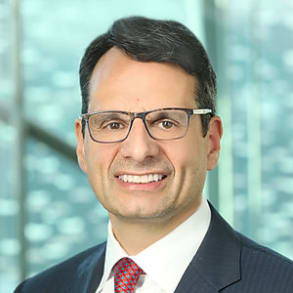David Hackam, Johns Hopkins pediatric surgeon-in-chief, discusses his lab, which focuses on necrotizing enterocolitis — a disease that effects babies who are premature. The researchers are focused on understanding what causes this disease and developing novel therapies. Click here to read the latest research publication on this illness.
Hi, I'm David Hack. I, the chief of pediatric Surgery at the Johns Hopkins Children's Center. And I wanna take a second just to tell you about some of the work that's going on in my lab. My lab focuses on a condition probably the most important condition that you've probably never heard about. It's a condition called necrotizing enterocolitis. It's a disease that affects tiny premature babies. A disease that is increasing in frequency as more and more premature babies are being born and a disease that attacks babies literally out of the blue. These are babies that are born prematurely, they're feeding in the neonatal intensive care unit or NICU and they're otherwise stable and then suddenly they develop abdominal distention. They lose the ability to tolerate feeds and they start passing bloody stools within 24 hours without surgery. Often these Children are either dying or dead, leaving behind, not just an extremely fragile child, but also a family that have often never heard about this condition and a medical team that wonders what they did wrong to cause this in the first place. And the truth is they did nothing wrong. This is a disease that develops because of an of an abnormal interaction between bacteria in the gut and immaturity of the child's intestine and immune system. Our lab has focused on trying to understand what causes this disease and to develop novel therapies so that we can prevent the devastation that it causes in seeking to understand the causes of necrotizing in our colitis or neck. We've assembled a team of scientists from around the world, from Japan, from Korea, from Lebanon, from different countries in Europe, including Austria and the Netherlands. And of course, here in the United States of America and using these different diverse perspectives, we've been able to gain clues as to how this condition occurs. We've identified a switch in the lining of the intestine called to like receptor four or TLR four that gets woken up, awakened by abnormal bacteria in the lining of the intestine. The bacteria themselves get turned into an angry state either by the stress of the premature birth or conditions in the environment and by becoming what we call dis biotic. These bacteria trigger the switch to activate a cascade of injury in the intestine that spreads like wildfire until it consumes the life of the child. And surgery can put out that fire but never completely. Only through research can we understand what makes a switch turn on, what keeps it on and of course, how to turn it off in the first place. And through collaborative research from my lab and other partners in other academic centers around the world, as well as industry partners. We've been able to develop agents that were turning into therapies that so far we've been able to test in tiny mice and tiny piglets and hopefully one day uh in Children, this just gives you an idea of the type of work that we're performing uh in understanding the causes of neck. But of course, it has to go beyond the individual patient. We have to understand why babies are at risk for developing neck in the first place. Answering questions like why does neck attack some of our most vulnerable patients? Why does it run in families? And are there genes that trigger neck from occurring? And that if turned off could protect babies and also give clues as to when neck might present. Finally, we focus on the mom, not just because she's of course a victim when her child develops the disease, but might represent the very first line of defense from the disease occurring in her infant. In the first place. We've studied uh mechanisms and reagents that we can provide the mom in terms of dietary supplements in terms of other treatments so that if premature birth is threatened, her child can be protected before that little baby is ever born. And so that's what our lab is working on. And we're excited to share our results both here but of course, in publications and conferences that we're delighted to participate in around the world. Thank you for listening.



